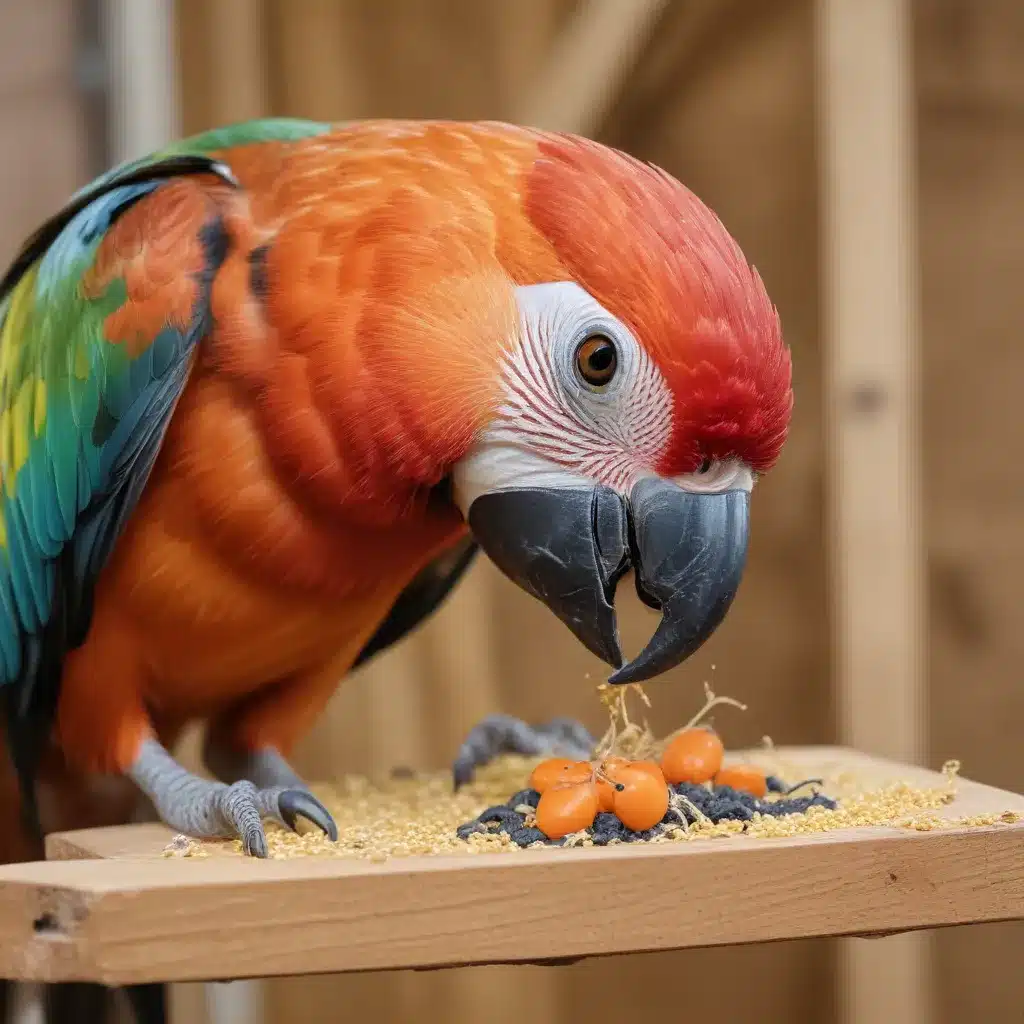
Nutritional Considerations for Avian Enrichment: Enhancing Mental Stimulation
As an experienced avian caretaker, I understand the vital role that nutrition plays in supporting the overall well-being of captive birds. While providing a balanced diet is essential for physical health, it is equally important to consider how nutritional elements can be leveraged to enhance mental stimulation and enrich the lives of our feathered companions.
Foraging Behaviors and Food Presentation
In the wild, birds spend a significant portion of their day engaged in foraging behaviors, searching for and acquiring their food. This natural activity not only fulfills their nutritional needs but also provides valuable cognitive stimulation and physical exercise. However, in captive environments, where food is readily available, birds may lack these important foraging opportunities.
To replicate the mental and physical challenges that wild birds face, it is crucial to incorporate foraging-based enrichment into our avian companions’ daily routines. One effective strategy is to present food in a manner that encourages natural foraging behaviors, such as scattering seeds or pellets throughout the enclosure or hiding treats in puzzle feeders or hidden compartments. This not only provides a source of nourishment but also prompts the birds to engage in problem-solving and exploration, keeping their minds active and their bodies in motion.
Additionally, varying the texture and presentation of food items can further stimulate a bird’s senses and promote exploration. Offering a diverse array of substrates, such as sand, soil, or shredded paper, for birds to scratch and dig through can mimic the natural foraging experience, triggering their innate curiosity and desire to uncover hidden treasures.
Cognitive Stimulation through Nutritional Enrichment
Beyond the physical aspects of foraging, the nutritional content of a bird’s diet can also be leveraged to enhance cognitive stimulation. Certain vitamins, minerals, and phytochemicals have been shown to support brain function and cognitive development in avian species.
For example, omega-3 fatty acids, such as those found in flaxseed or fish oil, have been linked to improved memory, learning, and overall brain health in birds. Incorporating these nutrients into the diet, either through targeted supplementation or by offering foods rich in omega-3s, can help stimulate and maintain optimal cognitive function.
Similarly, antioxidants, like those found in berries, leafy greens, and certain herbs, have been associated with reducing oxidative stress and supporting neurological well-being. Providing birds with access to these nutrient-dense foods can promote mental acuity and support their overall cognitive abilities.
Tailoring Nutritional Enrichment to Individual Needs
It is important to note that the specific nutritional requirements and enrichment needs of birds can vary greatly depending on the species, age, and individual preferences. Carefully researching the dietary needs and natural foraging behaviors of your avian companions is essential to developing a comprehensive nutritional enrichment program.
For example, some parrot species may thrive on a diet that incorporates a variety of fresh fruits and vegetables, while others may require a more specialized formula to meet their unique nutritional requirements. By understanding the specific needs of your birds, you can create a tailored enrichment plan that not only satisfies their dietary needs but also provides the cognitive stimulation they crave.
Consulting with an avian veterinarian or experienced avian nutritionist can be incredibly valuable in ensuring that your nutritional enrichment strategies are both effective and safe for your feathered friends. These experts can provide guidance on appropriate supplementation, food presentation techniques, and monitoring for any potential health concerns.
Enriching the Mealtime Experience
Mealtime presents a prime opportunity to incorporate enrichment and mental stimulation into a bird’s daily routine. By making feeding time an engaging and dynamic experience, you can encourage natural foraging behaviors, promote exploration, and foster a sense of purpose and fulfillment in your avian companions.
One innovative approach to mealtime enrichment is the use of foraging toys or puzzle feeders. These devices challenge birds to problem-solve and manipulate their environment to access their food, mimicking the challenges they would face in the wild. As birds work to extract their treats, they engage in valuable cognitive and physical exercises that can improve their overall well-being.
Another strategy is to rotate the presentation of food items, offering a variety of textures, shapes, and locations for your birds to discover. This not only keeps mealtime interesting but also encourages exploration and the expression of natural behaviors, such as climbing, hopping, and flapping.
Environmental Factors and Sensory Enrichment
The physical environment in which birds are housed can also play a significant role in their mental stimulation and overall well-being. Incorporating a diverse range of textures, perches, and hiding spots can create a visually and tactilely engaging habitat that stimulates a bird’s senses and promotes natural behaviors.
In addition to the physical environment, sensory enrichment can also be achieved through the strategic use of olfactory and auditory cues. Introducing safe, natural scents, such as herbs or essential oils, can pique a bird’s interest and encourage exploration. Similarly, playing soothing sounds or recordings of natural avian vocalizations can help create a calming and mentally stimulating atmosphere.
By carefully considering the nutritional, environmental, and sensory aspects of avian enrichment, we can create a holistic approach that addresses the unique cognitive and behavioral needs of our feathered friends. This multifaceted approach not only supports their physical health but also enhances their overall quality of life, promoting a happier, more engaged, and mentally stimulated avian companion.
For more information and expert guidance on avian nutrition and enrichment, I highly recommend exploring the resources available on the Mika Birds Farm website. Their team of experienced avian caretakers and veterinary professionals can provide invaluable insights and tailored recommendations to ensure your birds thrive in captivity.


